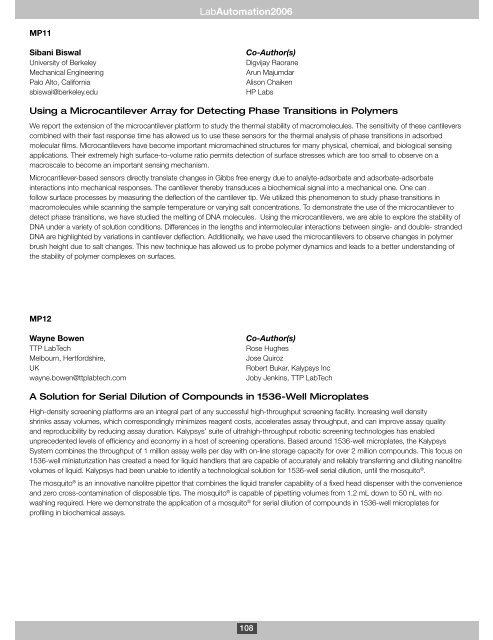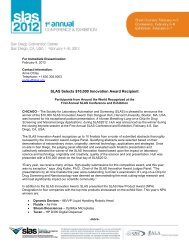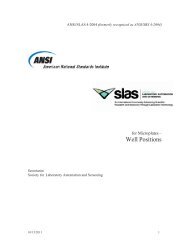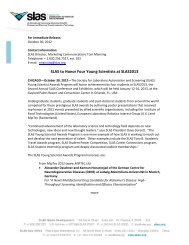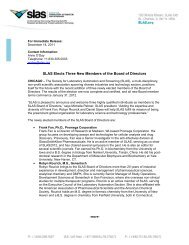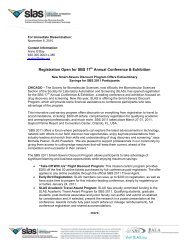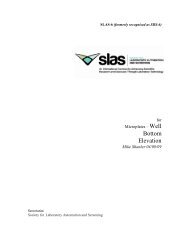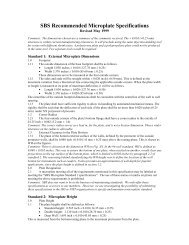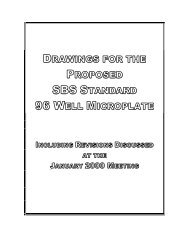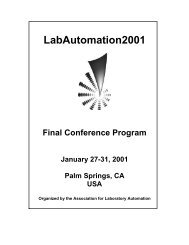LabAutomation 2006 - SLAS
LabAutomation 2006 - SLAS
LabAutomation 2006 - SLAS
You also want an ePaper? Increase the reach of your titles
YUMPU automatically turns print PDFs into web optimized ePapers that Google loves.
MP11<br />
Sibani Biswal<br />
University of Berkeley<br />
Mechanical Engineering<br />
Palo Alto, California<br />
sbiswal@berkeley.edu<br />
<strong>LabAutomation</strong><strong>2006</strong><br />
Co-Author(s)<br />
Digvijay Raorane<br />
Arun Majumdar<br />
Alison Chaiken<br />
HP Labs<br />
Using a Microcantilever Array for Detecting Phase Transitions in Polymers<br />
We report the extension of the microcantilever platform to study the thermal stability of macromolecules. The sensitivity of these cantilevers<br />
combined with their fast response time has allowed us to use these sensors for the thermal analysis of phase transitions in adsorbed<br />
molecular films. Microcantilevers have become important micromachined structures for many physical, chemical, and biological sensing<br />
applications. Their extremely high surface-to-volume ratio permits detection of surface stresses which are too small to observe on a<br />
macroscale to become an important sensing mechanism.<br />
Microcantilever-based sensors directly translate changes in Gibbs free energy due to analyte-adsorbate and adsorbate-adsorbate<br />
interactions into mechanical responses. The cantilever thereby transduces a biochemical signal into a mechanical one. One can<br />
follow surface processes by measuring the deflection of the cantilever tip. We utilized this phenomenon to study phase transitions in<br />
macromolecules while scanning the sample temperature or varying salt concentrations. To demonstrate the use of the microcantilever to<br />
detect phase transitions, we have studied the melting of DNA molecules. Using the microcantilevers, we are able to explore the stability of<br />
DNA under a variety of solution conditions. Differences in the lengths and intermolecular interactions between single- and double- stranded<br />
DNA are highlighted by variations in cantilever deflection. Additionally, we have used the microcantilevers to observe changes in polymer<br />
brush height due to salt changes. This new technique has allowed us to probe polymer dynamics and leads to a better understanding of<br />
the stability of polymer complexes on surfaces.<br />
MP12<br />
Wayne Bowen<br />
TTP LabTech<br />
Melbourn, Hertfordshire,<br />
UK<br />
wayne.bowen@ttplabtech.com<br />
Co-Author(s)<br />
Rose Hughes<br />
Jose Quiroz<br />
Robert Bukar, Kalypsys Inc<br />
Joby Jenkins, TTP LabTech<br />
A Solution for Serial Dilution of Compounds in 1536-Well Microplates<br />
High-density screening platforms are an integral part of any successful high-throughput screening facility. Increasing well density<br />
shrinks assay volumes, which correspondingly minimizes reagent costs, accelerates assay throughput, and can improve assay quality<br />
and reproducibility by reducing assay duration. Kalypsys’ suite of ultrahigh-throughput robotic screening technologies has enabled<br />
unprecedented levels of efficiency and economy in a host of screening operations. Based around 1536-well microplates, the Kalypsys<br />
System combines the throughput of 1 million assay wells per day with on-line storage capacity for over 2 million compounds. This focus on<br />
1536-well miniaturization has created a need for liquid handlers that are capable of accurately and reliably transferring and diluting nanolitre<br />
volumes of liquid. Kalypsys had been unable to identify a technological solution for 1536-well serial dilution, until the mosquito ® .<br />
The mosquito ® is an innovative nanolitre pipettor that combines the liquid transfer capability of a fixed head dispenser with the convenience<br />
and zero cross-contamination of disposable tips. The mosquito ® is capable of pipetting volumes from 1.2 mL down to 50 nL with no<br />
washing required. Here we demonstrate the application of a mosquito ® for serial dilution of compounds in 1536-well microplates for<br />
profiling in biochemical assays.<br />
108


